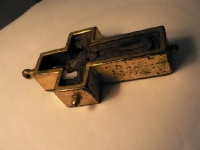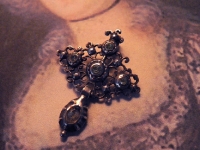



Les bijoux dénommés « Brésils » Aux XIX et XXe s., le grenat est la pierre fine communément employée en Roussillon, mais aussi la citrine et la topaze du Brésil. Par extension le terme « Brésil » va être donné à ces bijoux. La citrine est une variété de quartz de couleur jaune due à la présence d’infimes quantités d’oxydes de fer. La topaze est, par contre, un silicate d’aluminium comme le grenat. … Continuer la lecture
Tableau de Paul Gervais conservé à l’Hotel Pams à Perpignan, dans le salon jaune. Il s’agit de l’épouse de Jules Pams, et fille de Pierre Bardou-Job, le plus puissant industriel du papier à cigarettes de France à cette époque. On remarquera une splendide parure composée d’un collier de perles aux trois éléments en or et émeraudes, un pendentif et deux agrafes. Leur style oscille entre néo-renaissance et Art nouveau. Il … Continuer la lecture
Ce type de boucles d’oreilles a été en usage en Roussillon au milieu du XIX e s. comme l’atteste ce modèle issu d’un trésor d’ermitage et une autre paire en collection particulière. Il est interessant de voir qu’un exemplaire existe aussi dans la collection du Muséo del Traje de Madrid: http://ceres.mcu.es/pages/Main Voici la description: Pendent de trois étages. la dormeuse d’abord, incrustée d’un diamant en rose, chaton en argent et en … Continuer la lecture
Coronament de la joia de granat Els darrers anys del segle XIX, el regionalisme té un paper cabdal en la creació artística del període de prosperitat rossellonesa anomenat Bella Època, durant el qual no es deixarà de fer perdurar els signes de vinculació amb les arrels catalanes. La joia entra en una dualitat ben orquestrada entre els conceptes de progrés i de tradició, esdevin llavors un emblema de catalanitat, un … Continuer la lecture
L’herència de la noblesa Durant el Segon Imperi neix un nou interès per al segle XVIII, que dóna llum, en les arts decoratives, a l’estil Pompadour. Difosa per la emperadriu Eugènia, admiradora de la personalitat de Maria Antonieta d’Àustria, aquesta tendència influirà molt en la joieria. La Catalunya Nord torna a posar de moda una creu prestigiosa i imposant anomenada creu badina pel tremolor degut a una frontissa amagada. … Continuer la lecture
El granat de totes formes Deixar la muntura de les altres pedres per a llestar el granat en composicions subtils d’avantguarda és una de les gosadies de la joieria catalana d’aquest final de segle XIX. Gràcies al domini tècnic i a una adaptació ideal al mercat, els joiers, a la fi del Segon Imperi, han sabut donar una buf novador a llurs joies, amb una línia que continua viva al … Continuer la lecture
La joia abans l’adveniment del Granat Si les joies simbolitzen els sentiments molt forts: amor, amistat, record d’un ésser estimat, poques joies s’han pogut conservar en aquest territori fronterer amb de destí tan aleatori, ara hispànica, ara a mans de França. Aquests objectes preciosos formen part, però, del parèixer d’una població catalana orgullosa dels seus heretages successius. Amb el retorn d’una certa estabilitat política, a la primera meitat del segle … Continuer la lecture
Der Granat in vielerlei Gestalt Es war eine der grossen Kühnheiten der katalanischen Schmuckherstellung Ende des 19. Jhdts. , die Verarbeitung anderer Steine zu Gunsten des Granat, der in ausgeklügelten Kompositionen verarbeitet wurde, aufzugeben. Durch ihre technische Meisterschaft und eine geglückte Marktanpassung haben es die Schmuckhersteller zum Ende des zweiten Kaiserreichs verstanden, ihrem Schmuck einen innovativen Atem einzuhauchen: in einer Stilrichtung, die sich bis in unsere Tage erhalten hat! … Continuer la lecture
Das Erbe des Adels Im zweiten Kaiserreich ((1852 – 1870) entsteht ein neues Interesse am 18. Jhdt. Es entwickelt sich ein Kunsthandwerk im Stile der Pompadour. Die Kaiserin Eugénie, die von der Persönlichkeit der Marie-Antoinette eingenommen war, begründete einen Trend, der grossen Einfluss auf die Schmuckherstellung gewann. Im Roussillon wird so ein kostbares und imposantes Kreuz an den aktuellen Zeitgeschmack angepasst. Dieses Kreuz wurde Badine-Kreuz genannt. Der Name entstand durch … Continuer la lecture
Regionalism Since the last years of the 19th century, regionalism has played a large role in artistic creativity in Roussillon, a period of prosperity worthy of the Belle Epoque, during which time there was no desire to lose the connection with the roots of Catalan art. The garnet becomes central to a carefully orchestrated debate between the concepts of progress and tradition, and has become an emblem of “Catalan identity”, … Continuer la lecture